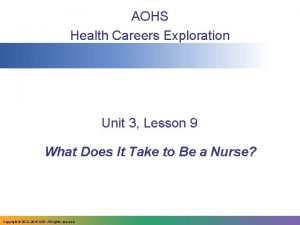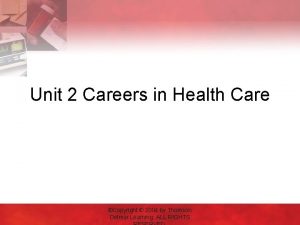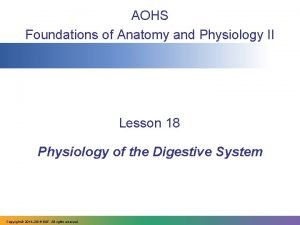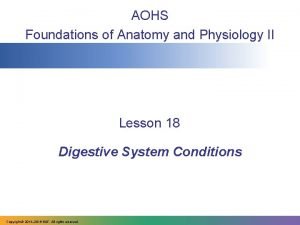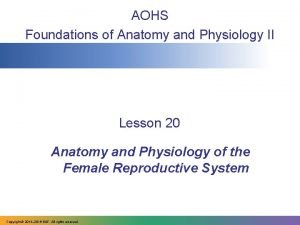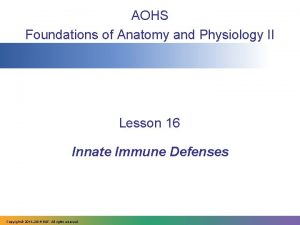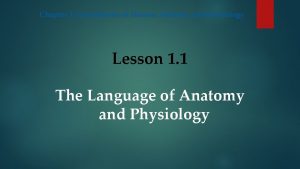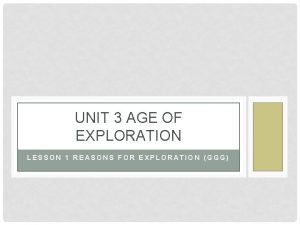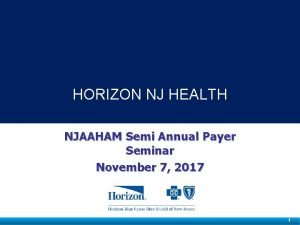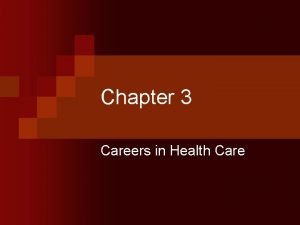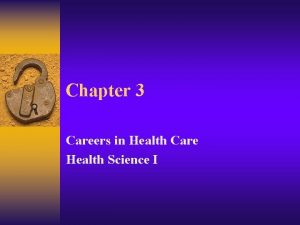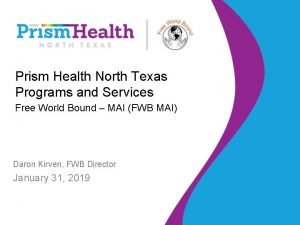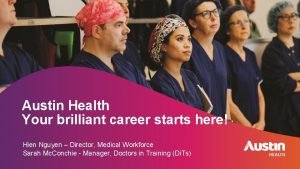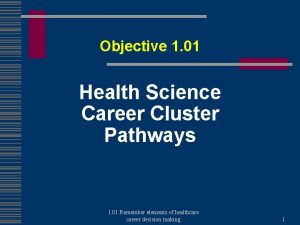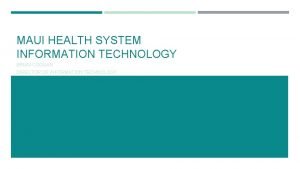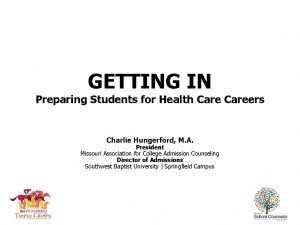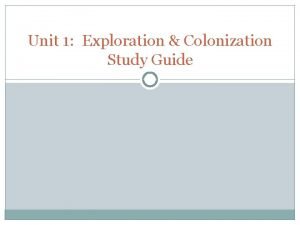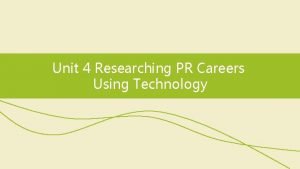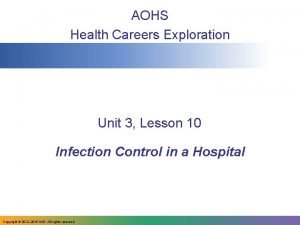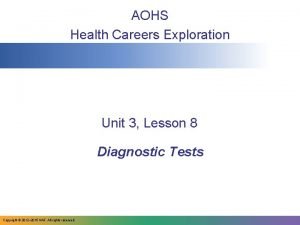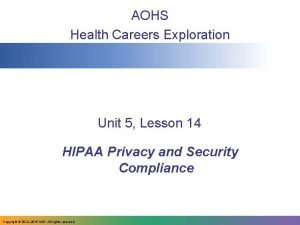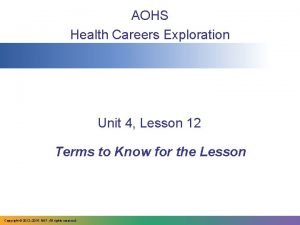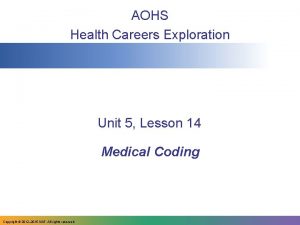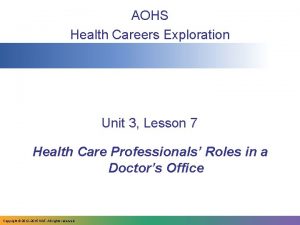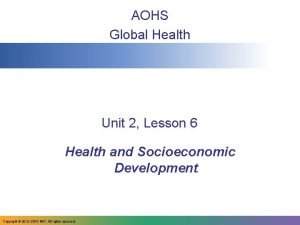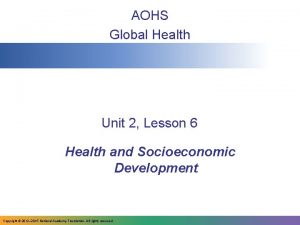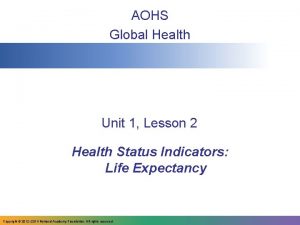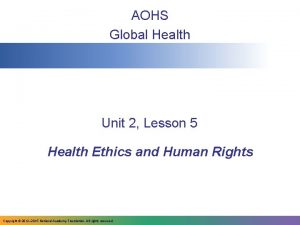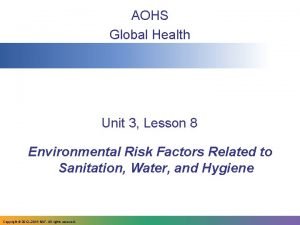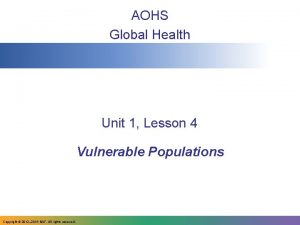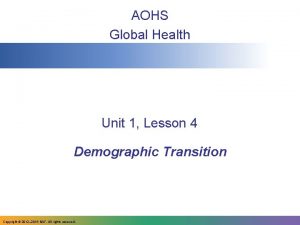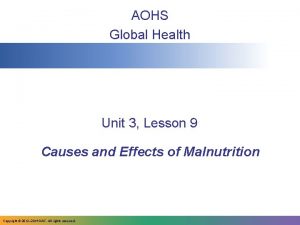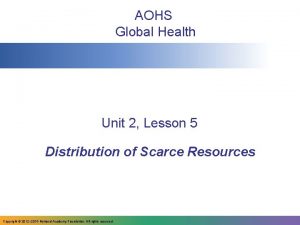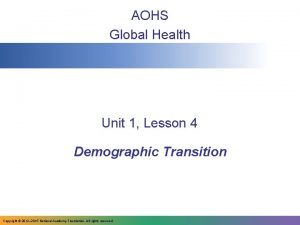AOHS Health Careers Exploration Unit 1 Lesson 2























- Slides: 23

AOHS Health Careers Exploration Unit 1, Lesson 2 A Brief History of Medicine and Health Care . Copyright © 2012‒ 2015 NAF. All rights reserved

In prehistoric (ancient) times, the body was a mystery 4000 BCE – 3000 BCE • Early cultures believed that evil spirits caused disease and death. • Treatment involved trying to rid the body of evil spirits. Sometimes this was done through trepanning, or making a hole in the skull. • Medicine during this time was plant based. • These beliefs and treatments still exist in some cultures today. Skull with trepanning hole What do you think people needed to know about the world to understand there are natural explanations for disease and death?

In ancient Egypt, physicians were also priests 3000 BCE – 300 BCE • The priest Imhotep is believed to be the first physician. • Ancient Egyptians were the first people to keep health records. • Egyptians held religious ceremonies to heal the sick. Depiction of Imhotep What qualities or behaviors would lead people to believe that the priest Imhotep was the first physician?

1500 BCE – 200 CE The ancient Chinese used holistic medicine The ancient Chinese believed that a person becomes sick when the energy flow in his or her body is blocked. Acupuncture, or puncturing the skin with needles, was one method they used to stimulate the flow of energy. Acupuncture is still a common practice today. Have you or anyone you know practiced a type of holistic medicine? What were the benefits? How would you define holistic medicine?

1500 BCE – circa 1100 CE Ayurveda, a type of holistic medicine, emerged in ancient India • Ayurvedic practitioners believed the human body is made up of elements similar to those of the universe, like air, fire, and water. In a healthy body, these elements are in harmony. • Ayurvedic treatments include massage, exercise, and herbal medication. Modern-day Ayurvedic pharmacy • Ayurvedic medicine is still sold in pharmacies in India today.

1200 BCE – 200 BCE The ancient Greek Hippocrates is believed to be the father of modern medicine • Hippocrates figured out that there were natural explanations for disease and death. • He promoted cleanliness to prevent disease. • The Hippocratic Oath, a code of ethics for doctors to follow, comes from Hippocrates. What do you know about the Hippocratic Oath? Why is it important that doctors follow an ethical code of behavior?

750 BCE – 400 CE Ancient Romans focused on sanitation The ancient Romans improved public health. They built aqueducts that brought clean water to people, and they removed garbage from city streets. How quickly do you think public health would deteriorate if we didn’t have sewers and access to clean water?

Medical advances stopped during the Dark Ages Cause 400 – 800 CE • Fall of the Roman Empire Effects • • • Study of medicine prohibited No major breakthroughs in medicine or health care Rampant epidemics

During the Middle Ages, the study of medicine resumed 800 – 1400 • Students attended the first medical universities during the 9 th century. • In the Arab world, doctors had to pass tests and get licenses. • The Arab physician Rhazes began to identify the differences among major diseases. Depiction of Rhazes practicing medicine Why do you think that being able to distinguish between the symptoms of different diseases was important?

During the Middle Ages, disease was rampant 800 – 1400 Spread of bubonic plague 75% of population in Asia and Europe died Do you think there is a greater or lesser risk for epidemics now? Why?

Dissection of the human body began during Renaissance 1350 – 1450 Artists like Michelangelo and Leonardo da Vinci created drawings of the inside of the human body. These drawings helped scientists understand the parts of the body and how they worked. Do you think medicine would have been able to progress without an understanding of anatomy? Why or why not? Drawing by Leonardo da Vinci the

The Renaissance brought new medicines and understanding of how the human body works 1350 – 1450 • Roger Bacon advanced the use of chemical remedies. • Michael Servetus described the way the lungs and circulation work. He also explained digestion.

What have you learned so far about the history of medicine? 1. Which discovery do you think was most important to the advancement of medicine? Why? 2. Which ancient civilization do you think made the most progress in medicine? Why?

Great strides were made in the 16 th, 17 th, and 18 th centuries 1500 – 1799 • Discovery of the tube connecting the ear and throat • Beginnings of modern surgery, including the first cesarean section • Invention of bifocal glasses, thermometer, and the microscope • Learned that limes prevent scurvy • Smallpox vaccine developed • First pharmacists

The 19 th century’s Industrial Revolution impacted medicine Women had important roles: 1800 – 1899 • Clara Barton founded the American Red Cross. • Florence Nightingale was the founder of modern nursing. Medicine grew rapidly: • Stethoscope and hearing aid invented • Safer surgery with antiseptics • First blood transfusion • Vaccines for fatal diseases Clara Barton

Louis Pasteur’s discoveries saved millions of lives 1800 – 1899 • Pasteur developed a theory that germs cause disease. He proved that heat can be used to kill harmful germs in food like milk. The process is called pasteurization. • Pasteur also developed vaccines against rabies and other diseases. • Pasteur’s ideas about sanitation helped control the spread of disease. Why do you think the discovery that germs cause disease was a major breakthrough in medicine?

Medicine changed dramatically in the 20 th century • X-ray, CAT scan, and MRI • Identification of blood groups 1900 – 1999 • Viruses grown in cultures • Penicillin, insulin for diabetes, polio and chickenpox vaccines • Open-heart surgery and organ transplants • In vitro fertilization • Advances in psychology and psychiatry What new professions do you think emerged in the 20 th century because of the advances in medicine?

1900 – 1999 In 1952, the structure of DNA was discovered The first use of gene therapy to treat disease occurred in 1990. Today, scientists are excited that the study of gene therapy may lead to a cure for most inherited diseases. This research wouldn’t have been possible without the discovery of DNA. What do you know about DNA? Explain what DNA is in your own words.

Health care legislation characterized the 20 th century 1900 – 1999 There were a number of legal and social battles in the 20 th century about how to provide affordable health care. • 1965: Medicare and Medicaid were introduced. • 1990: The Americans with Disabilities Act made it illegal to discriminate based on disability. • 1996: HIPAA protects patient privacy and made it easier to get health insurance.

The 20 th century began and ended with major pandemics 1900 – 1999 Influenza pandemic AIDS 1918 Discovered in 1981 21 million people killed Over 25 million killed; still claiming lives What effect do you think the discovery of AIDS/HIV had on people in your parents’ generation? How has it impacted your generation?

The 21 st century ushers in the Affordable Care Act • Young adults covered under parents’ insurance 2000 – 2099 • Prohibits preexisting condition exclusions • Requires most insurance plans to offer free preventive services • Allows Americans to purchase insurance plans through online Health Insurance Marketplaces Do you think health care should be free for all Americans? Do you think Americans should be required to have health insurance?

Major discoveries will be made in the 21 st century So far: 2000 – 2099 • A human embryo was cloned. • The Human Genome Project was completed. • Scientists prepare for bioterrorist attacks and possible new pandemics, like the bird flu virus. • Information technology is used to share knowledge between scientists and physicians all over the world. What do you think will be some of the most important discoveries in medicine in the 21 st century?

Understanding history helps us make progress • Sanitation can help prevent the spread of disease. • Chemical remedies can treat disease. • Microorganisms are the cause of disease. • Healthy organs can replace failing ones. • DNA is the building block of genetic code. • Gene therapy can be used to treat disease.
 Aohs health careers exploration
Aohs health careers exploration Unit 3 lesson 9 health science
Unit 3 lesson 9 health science Unit 2 careers in health care
Unit 2 careers in health care Aohs foundations of anatomy and physiology 1
Aohs foundations of anatomy and physiology 1 Aohs foundations of anatomy and physiology 1
Aohs foundations of anatomy and physiology 1 Aohs foundations of anatomy and physiology 1
Aohs foundations of anatomy and physiology 1 Aohs foundations of anatomy and physiology 1
Aohs foundations of anatomy and physiology 1 The speed at which the body consumes energy
The speed at which the body consumes energy Aohs foundations of anatomy and physiology 1
Aohs foundations of anatomy and physiology 1 Ggg
Ggg Horizon nj health directory
Horizon nj health directory Chapter 3 careers in health care answer key
Chapter 3 careers in health care answer key Chapter 3 careers in health care key terms
Chapter 3 careers in health care key terms Njhealth.com
Njhealth.com Prism health oak cliff
Prism health oak cliff Austin health careers
Austin health careers Health science careers cluster
Health science careers cluster Maui health system careers
Maui health system careers Charlie health careers
Charlie health careers Chapter 3 careers in health care
Chapter 3 careers in health care Unit 2 exploration and georgia colonization
Unit 2 exploration and georgia colonization Career exploration unit
Career exploration unit Unit 1 exploration and colonization
Unit 1 exploration and colonization Unit 4 careers
Unit 4 careers

